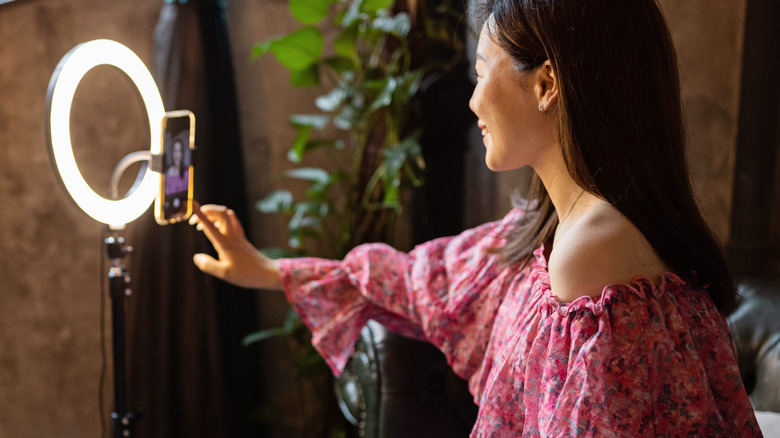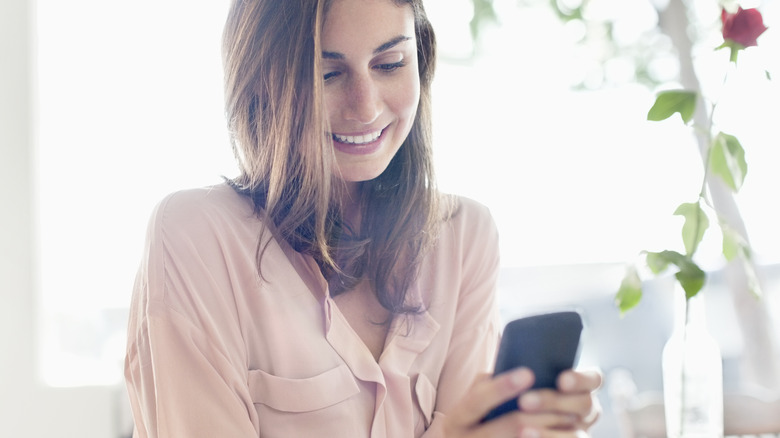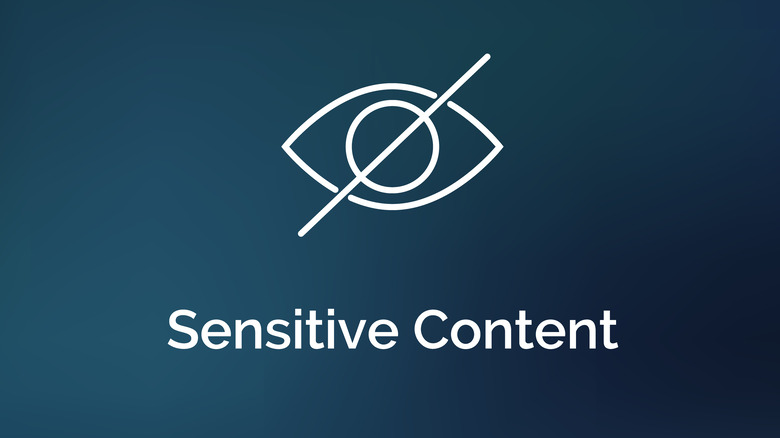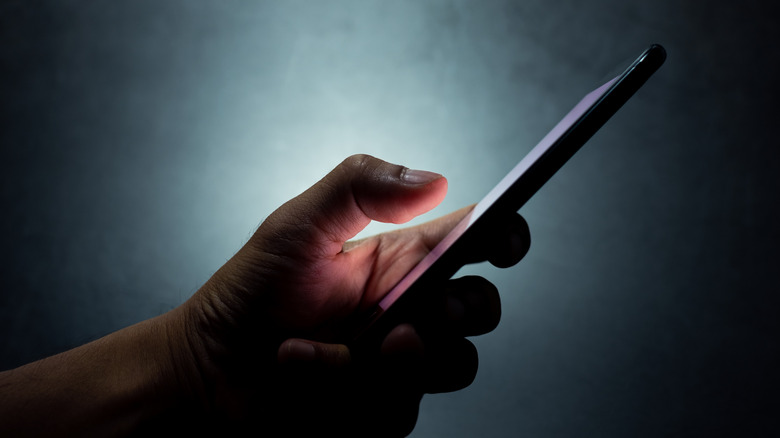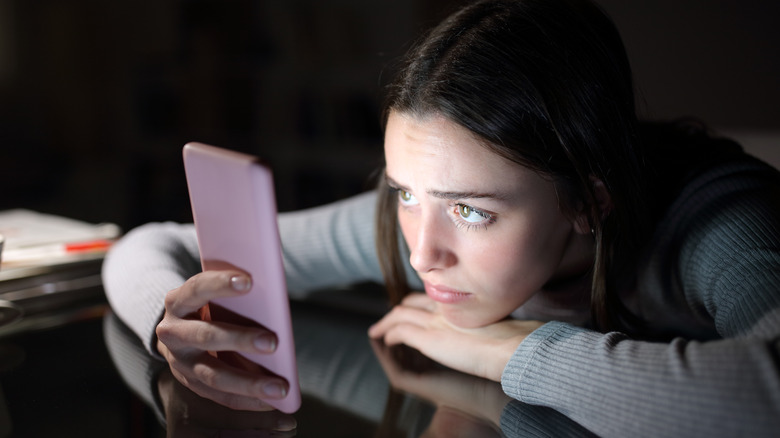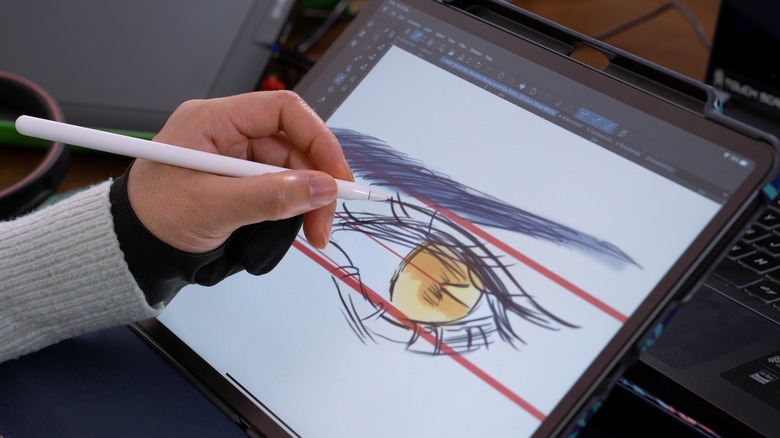Everything You Should Know About The Viral AI Photo Trend
If you ask a millennial what they're nostalgic about when it comes to their pre-digital photo childhood, it's the excitement of waiting for a roll of film to develop. There was no instant gratification of seeing how a portrait turned out, no retaking a selfie if you didn't like how you looked. It was a click-the-button and hope-for-the-best process, one that you would have to wait to see the results of. Sometimes it would take days, but some places like Walgreens could expedite the process, delivering you your rolls of film, fully developed, in an hour or less (via Bloomberg).
Today, the service has been replaced by printing your digital photos for you, with a turnaround time for developing film taking places like CVS 7-10 days. Maybe that's why everyone is jumping on the AI photo trend: to get part of that one-hour magic back.
When we say everyone, we mean everyone: celebrities like Chance the Rapper, Michaela Jaé Rodriguez, and Taraji P. Henson (along with everyone else in your feed, probably) have all shared AI-created portraits they purchased through the Lensa app. It's an easy trend to follow, too; all you need to do is download the Lensa app, pay for the package you want, submit 10-20 selfies, and wait 20 minutes. At the end of your wait, you'll have 50 unique portraits.
But before you start submitting selfies, there are a few dangers you should be aware of.
How the Lensa photo app works
If you want to jump on the Lensa AI photo trend, there are a few things you need to know first. When you download the app, you have to choose between a 7-day free trial or paying for a full year of access to Lensa's pro services. Then, after reading through "What to Expect" from their "Magic Avatar" tool (the possibility of some really weird pictures or errors), you have to acknowledge you're over 18.
The next step is uploading 10-20 selfies. The app says good examples include "close-up selfies" of the adult with a variety of facial expressions and backgrounds will get you the best results. Lensa notes at this stage that photos will be "immediately deleted" from their servers after your photoset is ready.
After you pick your selfies, you have to choose the number of photos you want. Even if you're a subscriber to the app, you'll be paying $5.99 for 100 "unique avatars," including "10 variations of 10 styles." You can also choose 50 (5 variations of 10 styles) for $3.99 or 200 (20 variations of 10 styles) for $7.99.
To create your photoset, Prisma Labs explains their app, Lensa, uses what's called Stability AI. They use a combination of an AI model known as LAION-58 and your uploaded photos, promising that no two photosets of creations are ever the same because, while the technology may be learning from your uploads, Prisma says Lensa does not save user uploads.
User beware: some Lensa photos may contain sensitive content
There's a troubling trend among the avatar photosets Lensa is creating for users: unwanted nude or barely-clothed avatars. Megan Fox shared her Lensa photos on Instagram, asking followers if their avatars were just as sexualized, adding: "Like why are most of mine naked??" On Twitter, one user wrote they received "a bunch of ai-generated nudes." Another user shared on Twitter that they had a similar experience even though they hadn't uploaded any nude photos: "Strange thing is I didn't submit any nudes since it would go against this Lensa app's policy yet it ended up generating nudes anyway???"
When BuzzFeed reporter Kelsey Weekman uploaded her selfies into the Lensa app, she wrote that of the 50 images in her photoset, "seven of them exaggerated [her] body to make [her] both curvier and thinner" than she actually is IRL (via BuzzFeed News). She added that these photos, which included "cartoon-like cleaveage and [a] tiny wasit," were created from a set of selfies, none of which showed anything below her shoulder.
If an avatar depicting nudity does end up in your photo set, it'll be blurred and marked as "sensitive content." When you try and open the photo, a pop-up warns you that the "image may contain sensitive content." From there, you can either cancel opening the image, choose to show sensitive content this one time, or choose always to show sensitive content within Lensa.
Lensa has no content moderation
When Olivia Snow investigated Lensa and its avatar creation for Wired, she found that no matter how modest the photos she submitted to the app were, she always received avatars with "spectacularly sized breasts and full nudity"—including photos she used from her childhood. Those photos heavily influenced her photoset, she said, creating explicit content with child-like features.
While Lensa says not to submit photos of children to its "Magic Avatar" creator, there is nothing stopping people from doing so, just like nothing is stopping them from submitting pictures of other people, whether it be celebrities they fantasize about or ex's they want to get revenge on (via Wired).
According to Tech Crunch research into the app, Lensa makes creating AI images of literally anyone as simple as hitting "upload." In their tests of the app's artistic skills, Tech Crunch found that even with poorly edited photos of celebrity heads on naked bodies, Lensa delivered "higher quality" photos. This has led to companies like Unstable Diffusion being able to capitalize on AI-generated pornography.
On their website, Prisma Labs explains that the creators of the AI model they use, LAION-5B, have added an "NSWF filter," but sexualization does still unfortunately happen. Since LAION-5B is an AI model "trained on unfiltered internet content...it reflects the biases humans incorporate into the images they produce." Prisma adds that they're aware that their filters don't stop everything, which is why they don't advise minors to use their app.
Critics have other privacy concerns for Lensa users
Besides being an easy means of creating fantasy or revenge porn, there are other privacy concerns users should be aware of. Lensa uses LAION-5B, a type of AI built on all publicly-available images, creating images from a mix of elements pulled from photos on places like DeviantArt or Getty Images, per BuzzFeed News. Andrey Usoltsev, Prisma Labs CEO, told the outlet Lensa uses photos and digital artwork to "inspire" its creations, so, technically, no avatar can ever be an exact copy of an existing piece of artwork.
Mixed in with these public images, however, can be private information. An artist who goes by the name Lapine shared on Twitter that they found photos their doctor took back in 2013 in the LAION dataset when they recently searched the website "Have I Been Trained." When Ars Technica went to authenticate Lapine's claims, they came across thousands of similar images, "each of which may have a similar questionable ethical or legal status."
Speaking of legal status, before submitting your selfies to Lensa, you should read over their terms and conditions and their privacy policy. In the privacy policy, Prisma, Lensa's parent company, says the company "does not use photos you provide...for any reason other than to apply different stylized filters or effects to them." However, in their terms and conditions, they state, "the company owns the rights to any digital artwork from using your selfies in the app" (via BuzzFeed News).
Artists aren't fans of the Lensa app
While there's no denying the images the Lensa app produces are beautiful, many artists have been speaking out against Lensa and other AI-generated work. "This is about theft," one artist BuzzFeed News spoke with explained. "Artists dislike AI art because the programs are trained unethically using databases of art belonging to artists who have no given their consent."
Yaron Inger, the cofounder and chief technology officer at Lighttricks—the company that brought us Facetune—thinks AI is a tool that can empower and inspire creatives. "If you think about artists and their creations," Inger told USA Today, "a lot of their creations are inspired by other artists." Like humans, the AI model takes in new data and dreams up new art with elements of what has inspired them.
For Jon Lam, a storyboard artist at Riot Games, that's part of what makes AI art so dangerous. Talking to NBC News, he explained that every time someone uses something like the Lensa app, even if it's just for their own inspiration, the program learns more. Mateusz Urbanowicz, another artist, compared AI art to Napster: something that might have started out with good intentions, but completely changed the way the music industry operated. After all, the more creations from apps like Lensa are shared on social media, the more people have been downloading the app to try it out, delivering more pieces of art faster and cheaper than any human artist is capable of.
